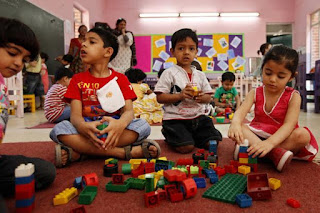Friedrich Wilhelm August Froebel was the youngest of the five
sons of Johann Jacob Froebel. Froebel experienced a difficult childhood,
because of the demise of his mother at a tender age of 9 months, and a couple of
years later, his father remarried, leaving his custody to his Uncle. That is a
lot of turmoil for a young child to face at an early age. At his father’s
insistence, he attended girl’s primary school Oberweissbach in Germany and from
1793 to 1798; he lived with his maternal Uncle, Herr Hoffman, in Stadt-Ilm,
where he attended the local town school.
From the year 1798 to 1800, he was an apprentice to a
forester and surveyor in Neauhaus. After several attempts and applications to
Universities, Froebel got acceptance in Univesity of Jena, but due to debt of
his tuition fees, he was sentenced to jail. He was a believer of Christ and had
a love for nature. He never was much interested in top preschools in Gurgaon, but had a strong liking for the subject
mathematics. From 1808-1810, he attended a Training institute run by John Pestalozzi.
Froebel left the institute that was run by Pestalozzi accepting his principles
as his apprentices, which were
i)
Permissive
school atmosphere
ii)
Emphasis
on nature
iii)
And
the object lesson
Being a believer of god and religion, he termed a specific
term called “spiritual mechanism” which happened to be missing in “Pestalozzi
theory”. He claimed that “Pestalozzi” took man only in appearance on earth,
which is a materialistic ideology. However, Froebel considered man to be of
eternal existence.
His
philosophy of education rested on certain beliefs: -
i)
Free
self expression
ii)
Creativity
iii)
Social
participation
iv)
Motor
expression
Froebel was known as the founder of Kindergarten, and named
his school “The Garden of Children”. Froebel stated :- (i) Unity of origin: All
existence originates with and in God. (ii)Unity of Purpose: Everything in
Universe, are interconnected from beings, ideas, objects making everything systematic. He gave importance to
the essence of spirituality in top preschools in India and believed every child has an innate spiritual essence,
which needs to externalize through self-activity.
 |
| Preschools in India |
The Principle of Development: - As we know, Change is the only thing which
is constant. Thus, Humans, nature and the earth keep on evolving towards
development and towards oneness. All parts of the universe are growing and they
are growing from within through the force of the inner law of their own beings.
The principle Of Self Activity: - All things strive towards a
divinely ordained perfection. Therefore, this principal states that all things
are ordained from self-activity. When we are born, Our Brains are self-active,
and prompt us to self-action. Children, when left to themselves reveal
spontaneous activity in their thoughts and movement.
Froebel’s Gifts: - For the complete education and training of
child, Froebel devised a series of Gifts. The gifts comprise carefully
graduated series of material, which possess all the novelty of all playthings,
yet they form the basis his educational method. They are
to train the senses of sight and touch, to give the child an idea of size and
surface and to present him a correct idea of numbers. The succession and order
of gifts are determined by the principal of development. There happen to VII
Gift’s of Froebel which emphasize on Education through observation and playful
methods.
Influence of Froebel’s Kindergarten method :- I) His
methodology raised the need for the school to function as a society where
everyone’s view and ideology is respected and responsibility is shared by all.
Brotherly rights are developed and voluntary coordination is practiced.





